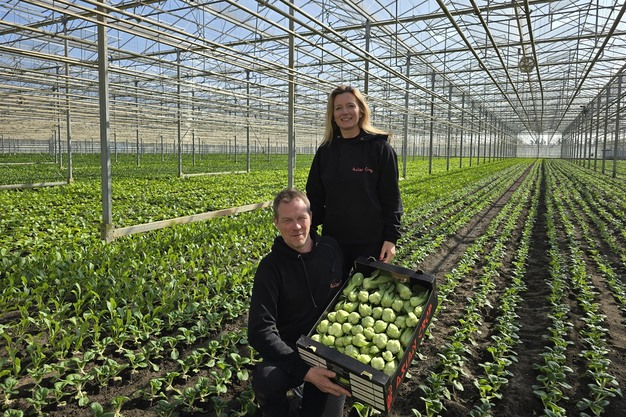The start of the Dutch Asian vegetable growing season has come at just the right time this year for Asian Crop, based in Velden, Limburg. The cultivation and trading company usually sources its Asian leafy vegetables in winter from Spain, where they are grown near Valencia. However, this year, availability and quality were major challenges due to severe weather conditions. "Everything that was supposed to arrive before Christmas was flooded, so we are happy to return to growing our own Dutch greenhouse vegetables," says Cees Visser, who runs the business with his sister, Danielle.
The acreage distribution at Asian Crop remains similar to last year. "Every year, we try to respond as best we can to customer demand, but we don't have fixed agreements or contracts with any customers," Cees explains. "In recent years, we have spread our sales more evenly. During the COVID-19 period, we lost a large portion of our sales to the food service sector. Fortunately, those customers have returned, but it also led us to focus more on supermarkets. We now have a balanced mix of retail, wholesale, supermarkets, and food service. This distribution works well—if one channel slows down, another tends to pick up."
 © Daan Sturm | HortiDaily.comCees and Danielle Visser
© Daan Sturm | HortiDaily.comCees and Danielle Visser
Shanghai Pak Choi runner-up
One thing that has not changed is the popularity of Shanghai Pak Choi, which remains the top seller in their range. "With more supermarkets including these Asian vegetables on their shelves, it is becoming much more familiar to consumers. In Germany, Shanghai Pak Choi is now widely cultivated outdoors, but the quality difference between that and our greenhouse-grown product is quite substantial, allowing us to differentiate ourselves well," says Cees. "Smaller varieties like Choi Sam, Mini Pak Choi, and Mini Shanghai Pak Choi are also in demand. The latter remains a favorite for serving whole on the plate."
When asked about the biggest challenges, Cees responds, "The entire Dutch greenhouse horticulture sector has not been portrayed in the best light lately. That's a great shame because it is a wonderful profession, especially with the combination we have of growing and trading. Fortunately, we have a strong team, and people tend to stay with us for a long time. But I do worry about where we will find young people to enter the industry in the future."
"On top of that, there's the energy situation. A few years ago, we were advised to fix our gas price for several years, which put us in a fortunate position. As a result, we have not been affected by sky-high gas prices recently, but that is about to change. While we consume very little gas overall, this means we now have to pay more for it. With the extreme weather conditions we've seen in recent summers and winters, a cold winter could make it too expensive to grow at all," says Cees. "Last year, a mild autumn allowed us to continue harvesting until November, ensuring strong production. In any case, we are ready to go full steam ahead in the coming months."
 For more information:
For more information:
Cees Visser
Asian Crop
Ebberstraat 12
5941 NN Velden
cees@asiancrop.nl
www.asiancrop.nl
